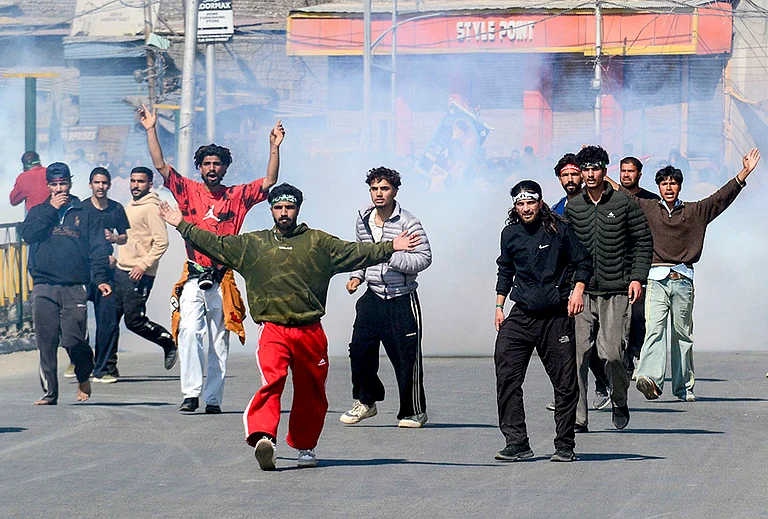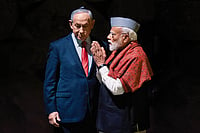In the ’90s, American diplomat Robin Raphel, the assistant secretary of state for South Asia, was a hate figure for the Indian establishment. She was influential in Washington as one of the close circle of friends around President Bill Clinton, commonly referred to by the media as FoB (Friends of Bill). Raphel was married to Arnold Raphel, a former ambassador to Pakistan who was killed along with General Zia-ul Haq in a plane crash in 1988. She was a key driver of American policy on Kashmir, and was regarded as “anti-Indian” by South Block.
Raphel questioned the accession of Kashmir to India and declared the Valley a “disputed” region between India, Pakistan and Kashmiris. She downplayed the Shimla Agreement, by which India and Pakistan had declared Kashmir a bilateral dispute and pushed for Kashmiris to be active participants in peace negotiations on their future. Recognising Kashmiris’ right to self-determination was seen in India as tantamount to challenging the concept of an integrated Indian nation.
As an FoB, Raphel had influence over the President in deciding the direction of US policy in India, Pakistan and Afghanistan. This was apparent when Bill Clinton mentioned Kashmir in his speech at the United Nations General Assembly in September 1993. “....bloody ethnic, religious and civil wars range from Angola to the Caucasus to Kashmir,” he had said, much to India’s discomfiture. Robin Raphel added insult to injury by explaining the President’s remarks: “It was meant to say, we see Kashmir on a radar screen along with Yugoslavia and Somalia and lots of other places in the former Soviet Union, Georgia, where there is civil conflict going on. We cannot easily overlook it, and there is a message in that.”
Kashmir exploded on the world stage in the late eighties. Hindu Pandits living in Srinagar and Jammu were targeted and forced out in 1987 by Kashmiri militants. But this did not evoke a strong international reaction. Instead, as a senior Indian diplomat recalls, the US charged the then governor of Kashmir, Jagmohan, of conniving to have the Hindu Kashmiris to leave. July 1988 marked the beginning of insurgency in Kashmir with a series of demonstrations, strikes and attacks on symbols of state power. This was triggered by a rigged state election and anti-India feelings stoked by militants funded and aided by Pakistan. The movement escalated and became one of India’s most important internal security challenges during the 1990s. Internationally, India was in the eye of the storm as Pakistan upped the ante and helped to fuel more unrest by not just encouraging local militants but pushing in well-trained terror groups across the Line of Control. At the same time, Islamabad drew the world’s attention to the alleged violation of human rights by Indian authorities and the armed forces deployed in the valley. There were allegations of rape and mayhem.
Insurgent groups sprouted across Kashmir. There was the homegrown Jammu and Kashmir Liberation Front and the radical Islamic and pro-Pakistani groups Hizb-ul-Mujahideen (HUM), Hizbollah, Harkat-ul-Ansar, and Ikhwanul Muslimeen. The Islamic groups talked of Nizam-e-Mustafa (rule of Muhammad) as the objective of their struggle against domination by Hindu India. Terrorism in the late ’80s was not much on the international radar and complaints against India’s human rights abuse in Kashmir were a constant in New Delhi’s interactions with the US and other Western democracies. America was tone deaf to any reference on terrorism emanating from Pakistan, as Islamabad since independence was close to Washington. As early as 1954, Pakistan was part of the US-led South East Asia Treaty Organisation (SEATO) and remained part of the US camp through the Cold War era. The US and Pakistan signed the Mutual Defence Assistance Agreement, formally confirming Pakistan's alignment with the West.
The British also played an insidious behind-the-scenes role in egging on Washington against India. Britain began pressing the US for official recognition of the Pakistani occupation of the northern parts of Kashmir, defying the accession to India. Significantly, when China and US had the détente after Richard Nixon’s breakthrough visit to Beijing in 1972, Kashmir was mentioned in the joint communique. It was a recognition of Kashmir as a disputed territory between India and Pakistan. New Delhi was furious and protested. Indo-US relations were at rock bottom. The US was a committed military ally of Pakistan, which received large quantities of arms from Washington. In 1979, when the Soviet army came into Afghanistan at the invitation of Afghan President Najibullah, Pakistan-US friendship was cemented. The CIA and the ISI worked in close coordination in sending arms across to the mujahideen forces fighting the godless Communists. With Pakistan as the central point in sending help to the Mujahideen, the US and Pakistan were together in the Afghan venture against the Soviets.
So, it is no wonder that Indian diplomats around the world had the tough task fending off criticism about human rights abuse in Kashmir. Ambassador Kanwal Sibal recalls the hectoring lectures Indian diplomats were subjected to in the US. Asia Watch, a well-respected US human rights monitor group which is taken seriously by the government, was constantly questioning Indian diplomats. In 1989, Patricia Gossman of Asia Watch travelled to India and met with human rights groups across the country. Sibal recalls that he had several run-ins with Gossman.
Things took a damaging turn when Benazir Bhutto took over as the first woman prime minister of Pakistan. The Oxford-educated Benazir was a favourite of the international media. She helped raise Kashmir to a new pitch and decided to make Kashmir an international issue. Pakistan’s international campaign against India reached the Human Rights Commission (now renamed as Human Rights Committee) in Geneva in 1994. Realising that Kashmir was getting much traction in the US and the west, Benazir Bhutto decided to nail India further by getting the OIC to table a resolution on India’s alleged human rights violations in Kashmir. India appeared to be in deep trouble and the then Prime Minister Narasimha Rao decided to personally direct New Delhi’s fight back.
First, he wanted a united response from India. He sent the leader of the Opposition Atal Bihari Vajpayee to Geneva, along with junior foreign minister Salman Khurshid. Dinesh Singh, the external affairs minister was unwell and in hospital. Also in the large Indian delegation were National Conference leader Farooq Abdullah and senior diplomat Hamid Ansari. Besides, finance minister Manmohan Singh—a highly-respected and popular figure at the UN for ushering in economic reforms in India—was dispatched to the distinguished visitor’s seat reserved for VVIPs to watch the proceedings. Benazir Bhutto was also in Geneva to raise the pitch. It was touch and go for India as Benazir had succeeded in had succeeded in galvanising international opinion against India.
Besides meticulously working out the details of the Geneva delegation, Narasimha Rao did more. He got the sick Dinesh Singh to travel to Tehran on a special chartered flight to talk to foreign minister Ali Akbar Velayati, said to be a personal friend of Rao. He took his Indian counterpart to meet President Hashemi Rafsanjani to deliver a letter from Rao. The Hindujas, a prominent Indian business family in the UK, were also roped in as they had extensive dealings with Iran. Dinesh Singh also ran into Chinese foreign minister Qian Qichen, who was visiting Tehran, and briefed him on the situation. No one expected much from the Chinese because of Beijing’s excellent ties with Pakistan. New Delhi decided to support China on another minor issue at the UN as a friendly gesture.
The result was a turnaround in Geneva. Rao succeeded in staving off a diplomatic embarrassment in Geneva. Pakistan was forced to withdraw the resolution. Iran and China both came to India’s aid. Things have come a full circle now as the world has become familiar with terrorism since 9/11. Much of this has to do with shifting the strategic goals of nations.























